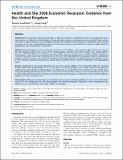Health and the 2008 economic recession : evidence from the United Kingdom
Abstract
Introduction: The economic recession which began in 2008 has resulted in a substantial increase in unemployment across many countries, including the United Kingdom. Strong association between unemployment and poor health status among individuals is widely recognised. We investigated whether the prevalence of poor health at a population level increased concurrent to the rise in unemployment during the economic recession, and whether the impact on health varied by geographical and socioeconomic circumstances. Method: Health, demographic and socioeconomic measures on 1.36 million survey responses aged 16-64 were extracted from the Quarterly Labour Force Survey of the United Kingdom, collected every three months, from January 2006 to December 2010. The likelihood of self-reporting poor health status and specific types of health problems (depression, mental illness, cardiovascular and respiratory) across time were estimated separately using logistic regression. Explanatory variables included economic status (International Labour Organization definition), occupational class, age, gender, country of birth, ethnicity, educational qualifications, couple status, household tenure, number of dependents, and geographical region. Results: Unemployment (age-gender adjusted) rose from 4.5% in January 2008 to 7.1% by September 2009. The reporting of poor health status increased from 25.7% in July 2009 to 29.5% by December 2010. Similar increases were found for cardiovascular and respiratory health problems; not depression or mental illness. The prevalence of poor health status among the unemployed decreased from 28.8% in July 2008, to 24.9% by March 2009; but this was followed by an increase in poor health experienced across all regions and by all socioeconomic groups, including those who remained employed, regardless of their occupational class. Interpretation: Although our study found no exacerbation of pre-recession health inequalities, the rise in poor health status not only for the unemployed, but also among people who remained employed, regardless of their occupational class, justifies concern voiced among many public health commentators.
Citation
Astell-Burt , T & Feng , X 2013 , ' Health and the 2008 economic recession : evidence from the United Kingdom ' , PLoS One , vol. 8 , no. 2 , e56674 . https://doi.org/10.1371/journal.pone.0056674
Publication
PLoS One
Status
Peer reviewed
ISSN
1932-6203Type
Journal article
Collections
Items in the St Andrews Research Repository are protected by copyright, with all rights reserved, unless otherwise indicated.

